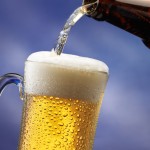Products that don’t live up to their hype, i.e., their marketing schemes, are a dime a dozen. The whole point of advertisements and statements like “new and improved” is to get people to buy the product. We all want to believe the pitch, but most of us realize there is a little “spin” involved. Does anyone truly believe that if you slap on Aqua Velva cologne that you’ll be fighting off supermodels who throw themselves at you? Yet some people must take these sales pitches and marketing ploys VERY seriously. A lawsuit was recently filed against make-up manufacture Lancome, alleging that their “24 hour” make-up didn’t actually last 24 hours.
The suit, filed April 30 in the U.S. District Court for the Southern District of New York, was brought by Rorie Weisberg, an orthodox Jewish woman who contends that she purchased this product to get her through the Sabbath, since she cannot apply (or re-apply) make-up from sundown Friday night until Saturday evening…hence the “need” for a 24 hour make-up. When I first heard of her suit, I presumed that some unfortunate event must have befallen her sometime during her Sabbath period or religious services she may have attended (perhaps her make-up streaked or made her look freakish, leading to expulsion from her house of worship), causing her to suffer some significant damage. In fact, however, she claims to have “tested” the product on a Thursday, and that it was “cakey”, and her nose was shiny by Friday morning. Therefore, she apparently chose not to even use the product that night for her planned Sabbath primping. So what gives?
While I do not claim to know much about women’s make-up, much less the importance of make-up during the 24 hour Sabbath period in the Jewish religion, I was surprised that this “problem” with Lancome’s product could have been this significant. Surely the plaintiff had been dealing with Sabbath make-up issues weekly for many years? Ultimately, the true problem revealed itself when I wiped the mascara off the lawsuit and learned that it is actually just another class-action suit, seeking millions in “damages” for unsuspecting consumers who didn’t get a full 24 hours out of their make-up. As I addressed in an earlier article related to a class action suit against Anheuser-Busch over the alcohol content of their beer, I don’t think we’ll really see a solution from this litigation for poor Ms. Wiesberg’s problem in particular. For that, perhaps she should find out what the women who worked with Jack Bauer in “24” used – they never seemed to have time to re-apply make-up, but always looked their best.


